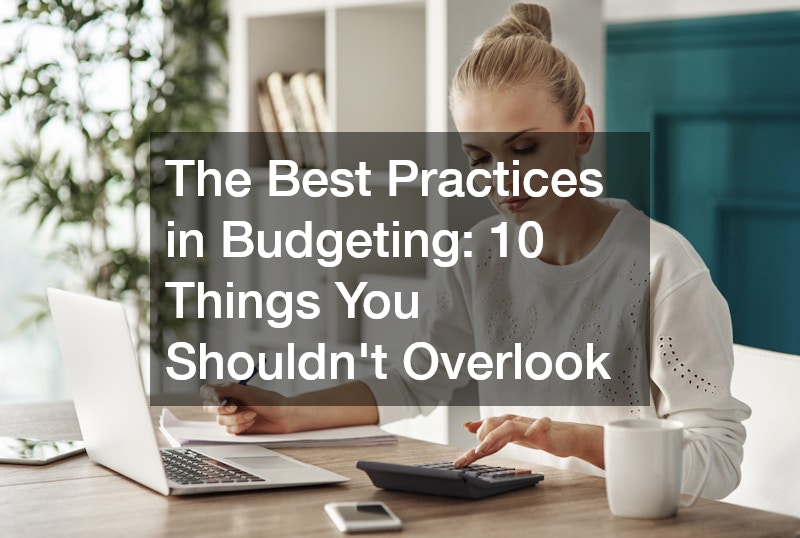
Effective budgeting is crucial for financial health and stability. Implementing the best practices in budgeting helps you manage your money more effectively, plan for future expenses, and avoid financial stress. In this article, we’ll discuss the best practices in budgeting by looking at ten often-overlooked areas requiring attention and planning. Whether you’re preparing for unexpected injuries, home maintenance, or special occasions like birthdays, knowing how to allocate your resources wisely can make a significant difference. Let’s dig into these areas, one by one, to ensure your budget covers all critical aspects.
1. Injuries
Unexpected injuries can wreak havoc on your finances if not budgeted for properly. One of the best practices in budgeting is to set aside funds for medical emergencies, which can include physical therapy. In case of injuries, seeing a physical therapist might be necessary, and these sessions can be costly if you don’t have a financial cushion.
Physical therapy is often required for a variety of injuries, from sports injuries to post-surgery rehabilitation. To handle these unforeseen costs, it’s smart to allocate a portion of your budget for such medical services. Regularly updating this aspect of your budget will help you manage these expenses without financial strain.
Including the cost of physical therapy in your budget ensures you won’t have to compromise on other essential expenses. This proactive approach to budgeting will give you peace of mind and financial stability. Ensuring that you can afford quality medical care without disrupting your financial plans is a cornerstone of the best practices in budgeting.
Maintaining a health savings account (HSA) can be an effective strategy. An HSA allows you to save pre-tax dollars for medical expenses, including physical therapy, which can ease the financial burden when injuries occur. This method of planning ensures that you have a dedicated fund for healthcare expenses, thus preserving your primary budget for other needs.
2. Home Maintenance

Home maintenance is another area that can drain your finances if neglected. One of the best practices in budgeting is to allocate funds specifically for home maintenance, including services like those offered by asphalt contractors. Asphalt contractors can help keep your driveway and other paved areas in good condition, preventing larger, costlier repairs in the future.
Regular maintenance and timely repairs can save you a lot of money in the long run. Besides asphalt work, other home maintenance tasks like roof repairs and plumbing should also be part of your budget. Keeping your home in top shape not only enhances its value but also provides a safe living environment.
Investing in home maintenance services such as those provided by asphalt contractors ensures you’re not hit with unexpected costs that could cripple your budget. Plan for these expenses annually to stay ahead of any surprise repairs. Adopting the best practices in budgeting for home maintenance helps maintain your property’s integrity and longevity.
Additionally, creating a maintenance schedule can be beneficial. By breaking down annual maintenance tasks into monthly or seasonal checklists, you can better manage your time and finances. This approach allows you to spread out expenses and avoid large, unexpected outlays, adhering to the best practices in budgeting by maintaining a consistent and manageable cash flow throughout the year.
3. Birthdays
Celebrating birthdays can be financially taxing if not planned for. One of the best practices in budgeting is to set aside a portion for special occasions, including birthday parties. Expenses can add up quickly, especially when you consider the cost of hiring a bakery to create a custom cake.
Planning ahead by including these expenses in your budget can make celebrations less stressful. Whether it’s a large gathering or an intimate family affair, knowing how much you can spend can help you make better decisions. Also, working with a reliable bakery can ensure that you get quality service within your budget.
Allocating funds for birthdays and other celebrations helps keep your finances in check. This approach ensures you can enjoy these special moments without worrying about overspending. Incorporating these best practices in budgeting allows you to celebrate without financial guilt or strain.
Consider setting up a sinking fund for birthday expenses. A sinking fund involves setting aside a small amount of money each month leading up to the event. This technique allows you to build up funds gradually, so the expense doesn’t impact your monthly budget all at once. This way, you can ensure that birthdays are joyous occasions without financial stress.
4. Home Improvement

Home improvement projects can be expensive, but they add significant value to your property. One of the best practices in budgeting is to set aside funds for these types of projects. Hiring bathroom remodelers, for example, can drastically change the appearance and functionality of your bathroom, but it comes at a cost.
When planning a home renovation, it’s important to get quotes from multiple bathroom remodelers and include a contingency fund for any unexpected expenses. This way, you won’t be caught off guard by additional costs. Regularly saving for home improvement projects ensures you’re prepared whenever you decide to make upgrades.
By budgeting for home improvement projects, you’re not only maintaining your property but also enhancing its value. This investment pays off in the long run, making your home more comfortable and potentially increasing its market value. Integrating the best practices in budgeting for home improvements safeguards your financial stability while enhancing your living space.
Additionally, prioritizing home improvement projects based on necessity and potential return on investment (ROI) can further refine your budgeting strategy. By focusing on projects that provide the highest ROI, such as kitchen and bathroom remodels, you ensure that every dollar spent contributes to increasing your home’s value. This method maximizes the financial benefits of your investments.
5. Repairs
Property repairs can be unexpected and costly. To manage these expenses, one of the best practices in budgeting is to allocate a portion of your budget for repairs. For instance, services like drain jetting can be essential when plumbing issues arise, and these can be quite expensive without planning.
Drain jetting services help keep your plumbing system in good working condition, preventing larger, more expensive issues down the line. Regularly budgeting for such services ensures that when the need arises, you have the funds available to cover the costs.
Setting aside money for repairs is a wise financial strategy. It helps you tackle problems promptly and efficiently, minimizing the risk of significant damage that could strain your finances. Embracing these best practices in budgeting for repairs can protect you from unexpected financial setbacks.
In addition to budgeting for immediate repairs, consider establishing an emergency fund specifically for home emergencies. This fund should cover larger, unexpected repairs that go beyond routine maintenance. This practice provides a financial buffer for significant repair costs, thereby safeguarding your regular budget from unforeseen disruptions.
6. Vehicle Maintenance

Vehicle maintenance is another critical area that demands attention in your budget. One of the best practices in budgeting includes setting aside funds for auto repair and regular vehicle upkeep. Regular maintenance can prolong the life of your vehicle and prevent costly repairs.
Auto repair costs can escalate quickly if not addressed promptly. Including these expenses in your budget ensures that you’re prepared for both routine maintenance and unexpected repairs. This way, you can keep your vehicle in good condition without breaking the bank.
By budgeting for auto repair, you ensure that your vehicle remains reliable and safe to drive. This proactive approach saves you money and extends the life of your car, making it a financially sound decision. Adopting the best practices in budgeting for vehicle maintenance helps avoid costly surprises on the road.
Additionally, consider creating a vehicle maintenance schedule that aligns with your manufacturer’s recommendations. By keeping up with regular oil changes, tire rotations, and other preventive measures, you can avoid more serious and expensive issues down the line. This ensures that your vehicle remains in optimal condition, reducing the likelihood of unexpected repair costs.
7. Funerals
Funeral expenses are often overlooked, but they can be a significant financial burden. One of the best practices in budgeting is to plan for these inevitable costs. Memorials and other funeral-related expenses should be considered when creating a comprehensive budget.
The cost of memorials can vary greatly, depending on the services and arrangements you choose. Having funds set aside for these expenses ensures that you’re not scrambling to find money during an already difficult time. This preparation relieves some of the financial stress associated with losing a loved one.
Including funeral expenses in your budget is a compassionate and practical decision. It allows you to focus on grieving and remembrance rather than financial concerns during a challenging time. Following the best practices in budgeting for funerals provides a sense of preparedness and peace during difficult times.
Purchasing life insurance can further alleviate the financial burden of funeral costs. Life insurance can cover a wide range of expenses, including funeral and burial costs, helping your family manage the financial impact of your passing. This step, in line with the best practices in budgeting, ensures that your loved ones are not left with a financial strain during an emotionally taxing period.
8. Medical Appointments

Regular medical appointments are essential for maintaining good health. One of the best practices in budgeting involves setting aside funds for routine check-ups, such as eye exams. Regular eye exams can help detect and prevent vision problems early on.
Medical expenses can add up, especially if you’re not covered by insurance or have high copays. Budgeting for these appointments ensures you’re not caught off guard by medical bills. It’s a proactive way to maintain your health and catch any potential issues early.
Including routine medical appointments like eye exams in your budget is a wise financial decision. It helps you manage your health care costs effectively, ensuring you can afford necessary treatments when needed. Embracing the best practices in budgeting for medical care fosters long-term health and financial security.
Additionally, consider enrolling in a health savings account (HSA) or a flexible spending account (FSA). These accounts allow you to save pre-tax dollars for medical expenses, which can significantly reduce your overall tax burden while ensuring you have funds available for healthcare needs. This approach provides a tax-efficient method to cover medical costs.
9. Lawn Care
Maintaining a well-kept lawn can be more expensive than it seems. One of the best practices in budgeting is to include lawn care in your monthly or annual financial plan. Hiring lawn care companies can ensure your yard remains pristine, but this comes with a cost.
Lawn care companies offer various services, from mowing to fertilization and pest control. Allocating a portion of your budget for these services ensures that your outdoor space is well-maintained without compromising your finances. Moreover, a well-kept lawn enhances your property’s curb appeal.
Planning for lawn care expenses helps you maintain a beautiful and healthy outdoor space. It’s an important part of home maintenance that contributes to the overall value and enjoyment of your property. Integrating these best practices in budgeting for lawn care ensures your property remains inviting and well-maintained.
Additionally, investing in the right tools and equipment for DIY lawn care can save you money in the long run. While hiring professionals ensures high-quality maintenance, having basic tools for mowing, edging, and weeding allows you to handle minor tasks yourself. This balanced approach combines professional services with a personal effort to maintain your lawn efficiently.
10. Property
Understanding the value of your property is crucial for financial planning. One of the best practices in budgeting is to invest in services like real estate appraisal. Regular appraisals can provide a clear picture of your property’s worth, helping you make informed financial decisions.
Real estate appraisals are essential when buying, selling, or refinancing a home. They provide an unbiased assessment of your property’s value, which is critical for various financial transactions. Including appraisal costs in your budget is a wise move to ensure accurate property valuation.
Budgeting for real estate appraisal helps you stay informed about your property’s market value. This knowledge is invaluable for planning and making strategic decisions regarding your real estate investments. Adopting the best practices in budgeting for property valuation keeps you well-informed and financially prepared.
Understanding your property’s value can assist in tax planning. Property taxes can fluctuate based on assessed value, and being aware of these changes allows you to adjust your budget accordingly. This proactive approach to property management ensures that you are prepared for variations in property-related expenses.
The best practices in budgeting cover a wide range of areas, from unexpected injuries and home maintenance to special occasions and property valuation. By proactively planning for these expenses, you can ensure financial stability and peace of mind. By following this guide, you can effectively manage your finances, prepare for unexpected costs, and enjoy a more secure financial future.



